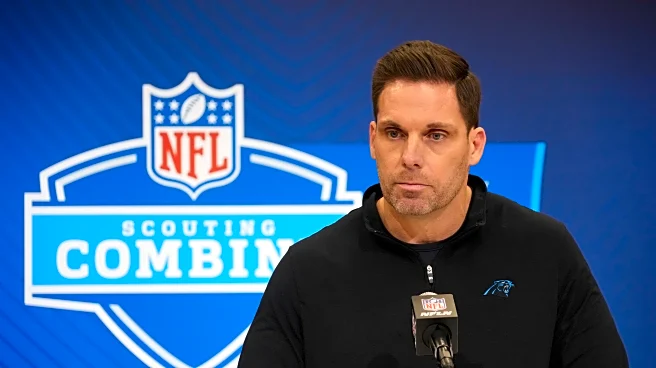What's Happening?
Marketing professionals are increasingly focusing on effectiveness as a key strategy, even when it does not directly lead to increased budgets. According to a survey conducted by Marketing Week in collaboration with Kantar and Google, 51% of over 1,000 brand marketers reported some level of budget increase after emphasizing effectiveness, while 10.6% experienced a decrease. Michelle Anderson, a fractional CMO, highlights that the true value of effectiveness lies in fostering informed discussions with stakeholders rather than merely securing larger budgets. The survey also reveals that 30% of marketers saw budget increases of up to 10% over the past two years due to their focus on effectiveness. However, some marketers struggle to measure the direct link between effectiveness and budget increases, particularly in B2B sectors where sales cycles are longer.
Why It's Important?
The emphasis on marketing effectiveness is crucial as it aligns marketing strategies with business objectives, potentially leading to better resource allocation and improved outcomes. By focusing on effectiveness, marketers can justify their strategies and demonstrate their impact on revenue and sales, which is vital for gaining credibility within their organizations. This approach can also help bridge the gap between marketing activities and business results, ensuring that marketing efforts are aligned with broader business goals. However, the challenge remains in measuring effectiveness accurately, especially for smaller brands with limited budgets. The findings suggest that while effectiveness is valued, it does not always translate into immediate financial rewards, highlighting the need for marketers to balance data-driven strategies with creative initiatives.
What's Next?
Marketers are likely to continue refining their measurement techniques to better demonstrate the impact of their efforts on business outcomes. This may involve developing more sophisticated metrics that link marketing activities to revenue and sales, thereby strengthening their case for budget increases. Additionally, there may be a push towards integrating effectiveness into the organizational culture, ensuring that marketing strategies are consistently aligned with business objectives. As marketers strive to find the right balance between measurable and creative initiatives, they may also explore new ways to communicate the value of their efforts to stakeholders, potentially leading to more informed decision-making processes within organizations.
Beyond the Headlines
The focus on effectiveness in marketing raises important questions about the role of creativity and innovation in the industry. While data-driven strategies are essential for demonstrating impact, there is a risk that an overemphasis on measurement could stifle creativity. Marketers must navigate this tension by finding ways to incorporate innovative ideas into their strategies while still maintaining a focus on measurable outcomes. This balance is crucial for ensuring that marketing remains a dynamic and impactful field that can adapt to changing consumer preferences and market conditions.










